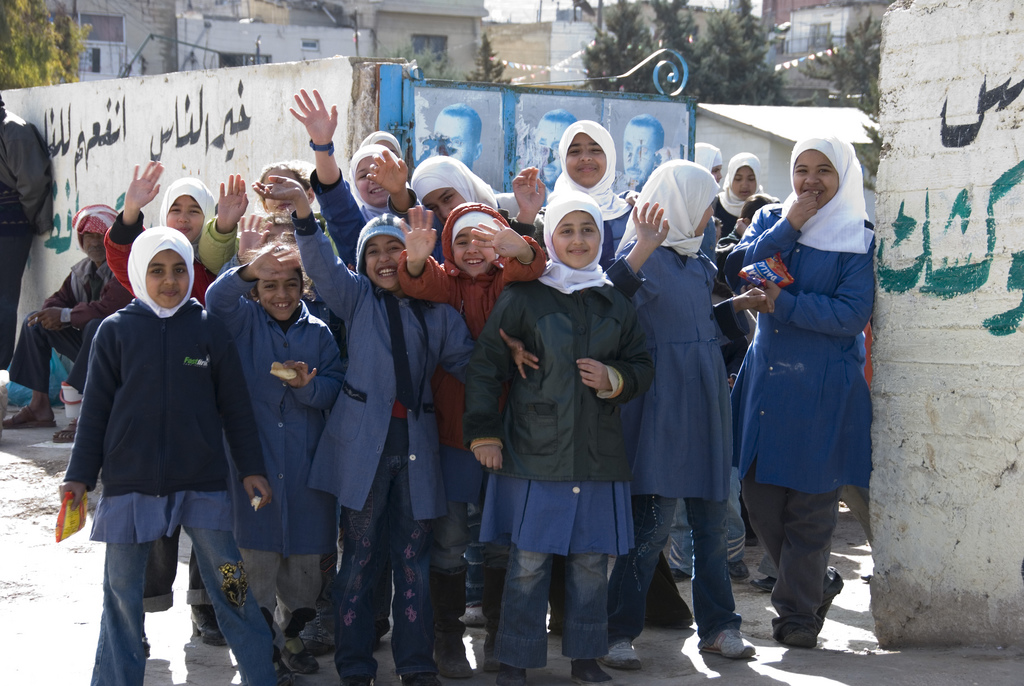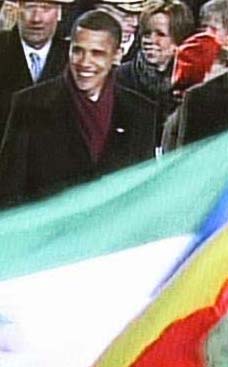
"There is a level of sweet formality in Jordan. People greet each other in the morning with a handshake, at least. If they’re fond of each other, there’s also a kiss. Or two. Or, three for a really enthusiastic hello. Men with men, women with women, even schoolboys on the street with each other. My special favorite thing is to watch is the police at change of morning shift. There’s nothing nicer than seeing the police greet each other with firm handshakes, watch the warm smiles turn into kisses on each other’s cheeks, But back at school, I’ve said hello to my colleagues and I’m on my way to the school library."
Peace Corps Volunteer Small Olympian Bear writes: What does a Volunteer do in the day?
Thursday, March 29, 2007
Another vignette on volunteer life and work
What does a Volunteer do in the day?
Caption: School kids in Baqa'a, a Palestinian camp outside Amman, Jordan. by Taromeet. Flickr Creative Commons Attribution-Noncommercial-No Derivative Works 2.0 Generic
For sure, not every day is the same, but here’s a random day this week. The outside temperature in my area in northern Jordan has finally hit the mid-50s, so it’s possible to take a hot shower and wash my hair. I apply some moisturizer, sun-block, and use my hair dryer, then head down hill wearing a turtleneck, corduroy slacks, and a fleece jacket. My briefcase is filled with brochures from American colleges interested in attracting international students.
This morning is a two hour English class at the madrasa thanowia (high school) in my town. My town, about half the size of Burlington, is basically the county seat. It contains 3 banks, a post office, several restaurants, at least 5 mosques, a hospital, many of whose doctors trained in the US, a lot of stores, and several elementary schools.
From about the fifth grade upwards education in Jordan is gender-separated. Coed education is virtually unknown. A lot of the smaller kids call out “good morning Susie” as I go by, a familiar sight after more than six months, but still slightly exotic as I’m just about the only woman in town who does not wear the hijab, the scarf that covers the head and neck of most Muslim women.
My first stop at the high school is the principal’s office. As usual, there are a bunch of people being served rounds of coffee and tea in teeny tiny glasses, a ritual that is carried on all day and night, broken only when one finally goes to bed at night. As a nurse charged with trying to “increase health awareness” among the youth of Jordan I frequently shake my head at the impossibility of it all. It’s absolutely aadi (ordinary, normal) to see toddlers scarfing down sweet hot tea after dinner (not coffee, though). Somehow everyone sleeps; though childhood weight problems and diabetes are said to be on the rise, I see very few overweight kids.
There is a level of sweet formality in Jordan. People greet each other in the morning with a handshake, at least. If they’re fond of each other, there’s also a kiss. Or two. Or, three for a really enthusiastic hello. Men with men, women with women, even schoolboys on the street with each other. My special favorite thing is to watch is the police at change of morning shift. There’s nothing nicer than seeing the police greet each other with firm handshakes, watch the warm smiles turn into kisses on each other’s cheeks, But back at school, I’ve said hello to my colleagues and I’m on my way to the school library.
Last December one of the English teachers whom I met at a wedding invited me to attend an “English assembly” she wanted to organize. Students in Jordan are all taught English from the first grade on. In order to be placed well at the university level, they must score high in English on their “towjihi” exam, roughly the equivalent of our SATs. Imagine if US students had to pass Arabic, or any, foreign language to get into college!
But these kids wanted to talk to an American and ask questions about American culture. This school has an enrollment of approximately 1000 girls. It’s got a great garden and outdoor assembly/exercise areas, a computer lab, a library, science labs, even a home ec kitchen. An American student would instantly feel at home in the ambiance. But here these kids are, speaking English with greater or lesser proficiency, and quite sophisticated in many respects, only most of them have never had an opportunity to talk with “a native speaker of English”, as they call us. (It does make me feel like a “specimen” of some sort, being called “a native speaker).
The original idea was to have about 100 of the better speaking students prepare a few remarks about their own culture, and ask me some informal questions about student life in America. I rolled my eyes at this. I’m 64 years old and know as much as any Martian about student life in America, but provided I could give generic answers, and not get caught in the secret lives of singers, movie stars and sports figures, I figured I could punt pretty well.
Students in Jordan, I discovered, take their work very seriously and very enthusiastically, with the kind of energy we usually reserve for sporting events. As does the faculty. By the time we finished with the planning, it had morphed into 200 or so girls, some of them coming from neighboring schools, a power point presentation by the girls in English on life in Jordan, a “boy” coming to represent the male point of view,(the “boy” was a fellow volunteer, graduate of a major university, working in a town close to mine), the Peace Corps Country Director and some other Peace Corps staff from Amman, the district superintendent from the Education Department, and probably some people I’m forgetting.
Out of that morning, some girls approached us and asked how they could apply to universities in the United States. I’m now running a weekly class on this topic. My daughter, who’s both employed by and graduated from Mt. Holyoke College in Massachusetts, is coming here for a visit next week and will also speak to them about her experience at an all women’s college.
There will be a lot to say about that, and some pictures.













